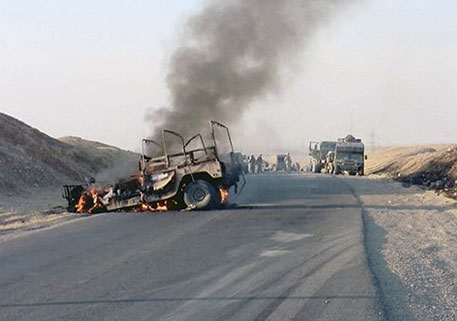
As Peter Newell was planning for the battle, he thought a bloody urban fight was not on anyone’s radar.
“There’s no way they’re going to order us into Fallujah with an armored task force,” said Newell, who commanded the Army’s 2nd Battalion, 2nd Brigade, 1st Infantry Division. “You don’t get into a big catfight like this. It’s not a good idea.”
But by the time the order came down, Newell’s soldiers were prepared. They had mastered small unit tactics while integrating different combat capabilities. However, the deployment had been worse than anyone had expected.
“We spent the month of April in one firefight after the other,” said Newell. “I even got caught and was ambushed one day.”
That firefight turned into a three-day clash.
As the first Iraqi elections approached, concerns over their legitimacy were alive in the war-torn nation and worldwide. Those elections couldn’t be successful if an entire province occupied by al-Qaeda stopped citizens from voting in the fledging and fracturing democratic process.
Fallujah had become an insurgent stronghold in the volatile Al Anbar province.
Fallujah attracted foreign fighters; had routes to Syria and Baghdad; and was known as the “city of Mosques,” where imams would provide leadership for the smoldering insurgency.
Once the battalion made its first breach into the city from the north, an overwatch position allowed Newell’s soldiers to effectively engage the enemy.
“We did a lot of damage,” said Newell. “We had the perfect fire support position that allowed us to use every asset to kill.”
The fighting was brutal. Battalion Command Sgt. Maj. Steven Faulkenburg was killed in action early in the battle. By the time his soldiers reached Phase Line Fran, Newell saw the sheer exhaustion on nearly every face.
“I don’t think there was anybody under 30, 32 hours of no sleep,” he said. “They were still functional, but you could see the crash coming.”
For four days straight, soldiers in the unit were in a firefight. Newell was deliberate in not giving the enemy time to rest or regroup. As the battalion pushed south, it met more hardcore al-Qaeda fighters who would fight to the last man.
Today, Newell remains conflicted about the battle but takes tremendous pride in the performance of the men and women who served under him. “I wish we could tell all the stories of all the people involved,” he added. “From privates to officers, so many amazing personalities did things above the call that anyone would expect.”
The families back home endured their own fights. Fallujah was fought on the global stage, and the families of Newell’s soldiers learned about the battle in near real time as it unfolded.
“We have not even begun to scratch the surface of what our families have gone through,” said Newell, “not the wives, not the parents and certainly not the kids who grew up at war.”
Learn more about Fallujah: 20 Years Later at fallujahstories.org.






